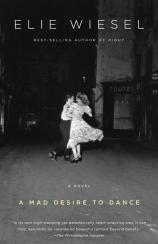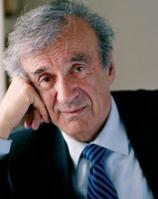A Mad Desire to Dance
Review
A Mad Desire to Dance
A man of mysterious wealth and traumatic background is handed from one psychoanalyst to another. It is hoped that, because she shares culture with him, the new doctor can help the patient better. But the case of Doriel Waldman turns out to be more complicated and difficult than Thérèse Goldschmidt had realized it would be. Using Freudian theory, she attempts to understand and heal him, but her work is thwarted by his non-compliance: he insists he is just mad.
In the hands of Elie Wiesel, Doriel's madness is not simply insanity. It is a dysfunction burdened with memory and fear, responsibility and uncertainty. A MAD DESIRE TO DANCE is not an easy book to read, but it is a rewarding one as Wiesel takes us from Polish forests to the dry heat of Jerusalem, from post-war France to religious Brooklyn neighborhoods. All the while, we, like Dr. Goldschmidt, are trying to understand the haunted and lonely Doriel who, in turn, is in search of the smile of a frightened child.
It is also not an easy book to describe. In post-modernist terms, our primary narrator, Doriel, is unreliable. He thinks he is sick but also cultivates his illness. He realizes that the key to health is locked in his memories but does little to release them. It is in his relationships with women that Dr. Goldschmidt looks for answers. Doriel's life is peppered with strange and romantic encounters with women. Would an unconditional love affair free Doriel from the demons (actually the dybbuk) in his soul? Wiesel's latest seems to be about hope and love and how they can be redemptive forces in even the darkest lives, unless Doriel's version of the truth cannot be trusted at all.
Filled with references to Jewish scripture, folklore and history, Doriel's story is often told in manic bursts. His mother was a Jewish Resistance agent during the war: her blond hair and flawless Polish allowing her to pass as Aryan. Doriel spent years in hiding with his father while his mother carried messages back and forth, occasionally coming to see them. His siblings were victims of anti-Semitic violence, and though his parents survived the war, they died before he was 13 --- but not before he learned more than he wanted to know of his mother's secret life.
Adopted by his loving and patient uncle and whisked away to an Orthodox community in Brooklyn, Doriel wrestles with faith and identity. His past, and especially the memory of his parents, trouble him, and he seeks truths outside his deeply religious community. Yet, even as his search takes him in what he feels to be spiritually dangerous directions, the connections to Judaism remain essential to him.
Doriel's ravings are paired with Dr. Goldschmidt's surprisingly personal case notes. She becomes obsessed with her odd and sad patient, and fears she is doing nothing to help him.
A MAD DESIRE TO DANCE is complex and challenging, more about history, brutality and faith than mental illness. Wiesel's 50th book is a compelling whirlwind of stories within stories, truths and half-truths, poetry and mythology. It is sure to amaze and perhaps even frustrate readers and is yet another important contribution by Wiesel not only to contemporary Jewish literature but to world literature as well.
Reviewed by Sarah Rachel Egelman on January 6, 2011
A Mad Desire to Dance
- Publication Date: April 13, 2010
- Genres: Fiction
- Paperback: 288 pages
- Publisher: Schocken
- ISBN-10: 0805212124
- ISBN-13: 9780805212129





